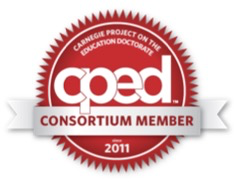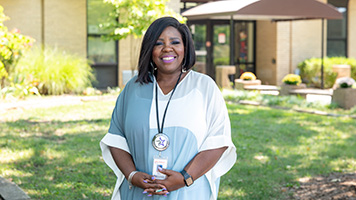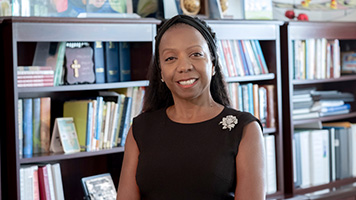Bridge Theory and Practice with Scholarship

Why Choose the Ed.D.?
The Doctor of Education program (Ed.D.) with an emphasis in Educational Practice provides an accelerated doctoral experience structured to leverage the benefits of the collaborative dissertation model and immerse students in action research as part of a cohort community.
Scholar-practitioners typically work as part of a dissertation team of two or more students to investigate a high-impact Problem of Practice (PoP). The research experience encompasses the scholarly process of conducting research and possibly collaborating with community stakeholders to review extant data related to the Problem of Practice. Students explore solutions to the Problem of Practice that impacts the local community and the educational workplace, and they also investigate national implications.
About the UMSL Ed.D. Program:
Students are admitted to the degree program and simultaneously to a Learning Community of Practice that is formed around a central theme. Our learning communities typically begin during the Fall semester. Members of the learning community advance through the program together as a cohort and complete the degree requirements within 3 to 3 ½ years. Students enroll in approximately 5-6 credits each semester. A collaborative Dissertation in Practice (DIP) is the culminating capstone project.
The GRE is not required for admission to this program. The Ed.D degree requires the completion of 80 credit hours. A master's degree in any discipline could be applicable. Consult with the faculty mentor associated with your respective cohort of interest for guidance on the transfer of your previous graduate degree coursework. A maximum of 39 credit hours can be accepted for the completion of a master's degree. Individuals with an earned Ed.S. degree should consult with the faculty mentor for further guidance regarding credit hour requirements.
Please note that our doctoral programs do not align with MO state requirements for administrative certification. Students interested in pursuing certification should inquire with the appropriate advising staff member to pursue our master’s or specialist degree programs in Educational Administration.
History
-
Class of 2024: Social Justice in Education
The Class of 2024 Learning Community began in the Fall Semester of 2021: Social Justice in Education -
Class of 2023: Advance Scholarship and Practice in Educational Leadership (K-12)
The Class of 2023 Learning Community began in the Fall Semester of 2020: Advance Scholarship and Practice in Educational Leadership (K-12) -
Class of 2023: STEM THEMES Education Scholars
The Class of 2023 Learning Community began in the Fall Semester of 2020: STEM THEMES Education Scholars -
Class of 2023: Workforce Development & Distance Learning and Technology
The Class of 2023 Learning Community began in the Fall Semester of 2020: Workforce Development & Distance Learning and Technology -
Class of 2022: Inquiry in Heritage Leadership for Sustainability, Social Justice, and Participatory Culture
The Class of 2022 Learning Community began in the Fall Semester of 2019: Heritage Leadership for Sustainability, Social Justice, and Participatory Culture -
Class of 2021: Higher Education Student Services
The Class of 2021 Learning Community began in the Fall Semester of 2018: Higher Education Student Services -
Class of 2021: Inquiry in Curriculum and Teaching and Learning in partnership with Shenyang Normal University
The Class of 2021 Learning Community began in the Fall Semester of 2018: Inquiry in Curriculum and Teaching and Learning -
Class of 2021: Leadership in Educational Practice
The Class of 2021 Learning Community began in the Fall Semester of 2018: Leadership in Educational Practice -
Class of 2021: Social Justice in Education
The Class of 2021 Learning Community began in the Fall Semester of 2018: Social Justice in Education -
Class of 2020: STEM Education Enhancement
The Class of 2020 Learning Community began in the Fall Semester of 2017: STEM Education Enhancement
News
 Doctoral student Tracy Smith begins tenure as principal of Ross Elementary School
Doctoral student Tracy Smith begins tenure as principal of Ross Elementary School Education alumna Paula D. Knight beginning new role as Jennings superintendent
Education alumna Paula D. Knight beginning new role as Jennings superintendent EdD student Britt Tate finds her place inspiring St. Louis students with art education
EdD student Britt Tate finds her place inspiring St. Louis students with art educationStudents seeking the Ed.D. degree are expected to meet the Graduate School’s relevant practitioner doctoral degree requirements and procedures.
Degree requirements
| 1. Learning Community of Practice Seminars | 15-20 | |
EDUC 7600 | Learning Community of Practice I | |
EDUC 7610 | Learning Community of Practice II | |
EDUC 7620 | Learning Community of Practice III | |
EDUC 7630 | Learning Community of Practice IV | |
EDUC 7640 | Learning Community of Practice V | |
EDUC 7650 | Learning Community of Practice VI | |
| 2. Laboratory of Practice | ||
| EDUC 7889 | Laboratory of Practice | 3 |
| 3. Required Common Courses | ||
| EDUC 7215 | Data Analysis for Educational Practitioners | 3 |
| EDUC 7395 | Research and Technical Writing for Educational Practitioners | 2 |
| EDUC 7615 | ||
| EDUC 7625 | Building Socially Just and Ethical Educational Communities | 3 |
| EDUC 7710 | Research Methods and Design for Educational Practitioners | 3 |
| ED REM 7781 | Qualitative Methods in Educational Research I | 3 |
| 4. Tools Courses | ||
| EDUC 7310 | Integrating Technology in Learning for Educational | 1 |
| EDUC 7325 | Grant Writing for Educational Practitioners | 1 |
| 5. Specialization | 30-60 | |
| Courses in an area of specialization (can include Master’s or Education Specialist work) | ||
| 6. Dissertation in Practice | ||
| EDUC 7998 | Dissertation in Practice Research | 8 |
Total: minimum 80 hours, post-bacclaureate
- Community Education 13
- Higher Education 12
- Leadership 24
- Psychology 21
- Teaching 113
- Doctoral 22
- Education Sciences and Professional Programs (ESPP) 41
- Educator Preparation and Leadership (EDL) 110
- Main Campus 133
- Character & Citizenship Education 6
- Doctoral Studies 21
- Higher Education 3
- Language, Literacy, and Culture 12
- Science Education 11
- Technology Education 6
- Educational Leadership 15
- Graduate 115
- Doctoral 22
 Include:
Include:

